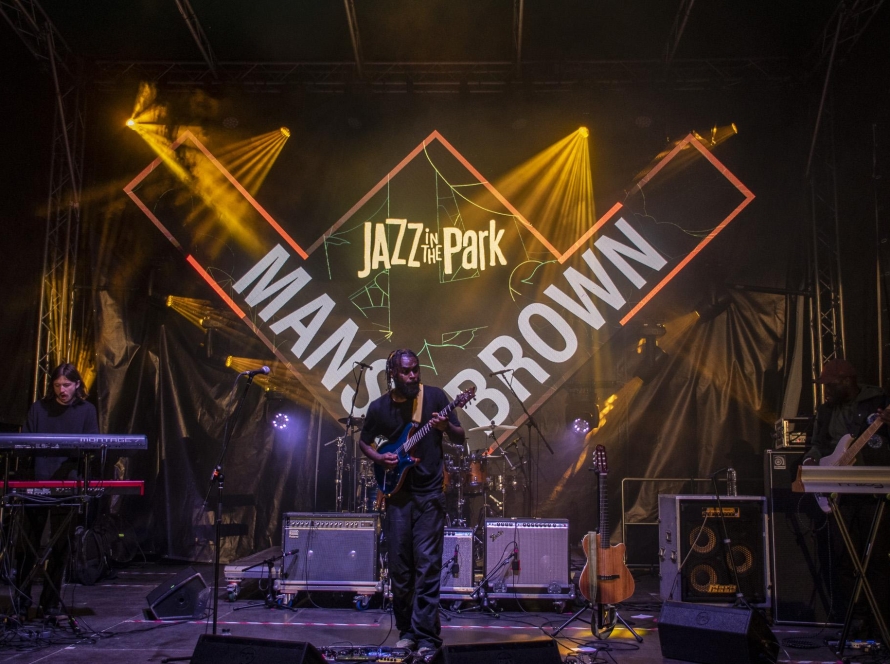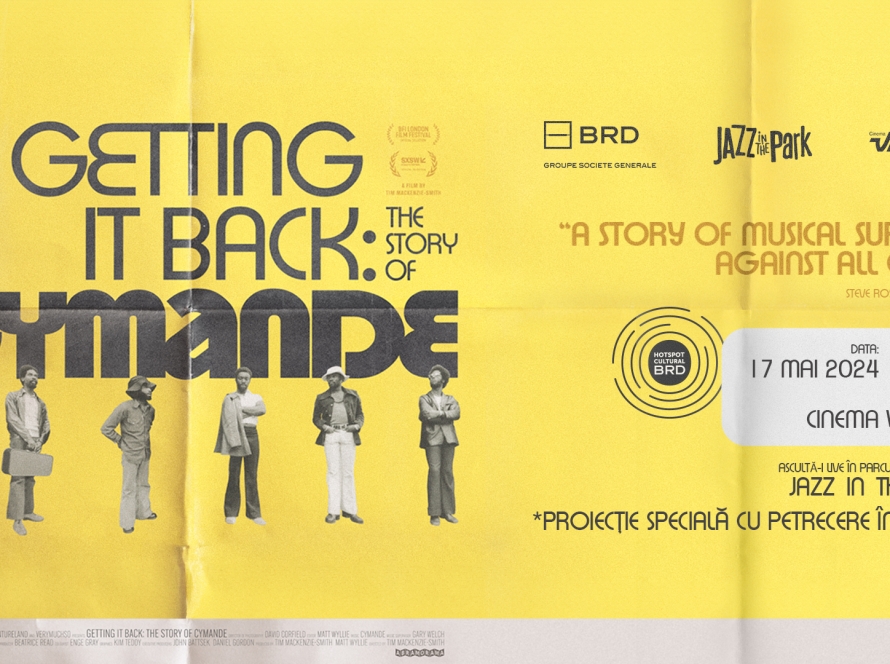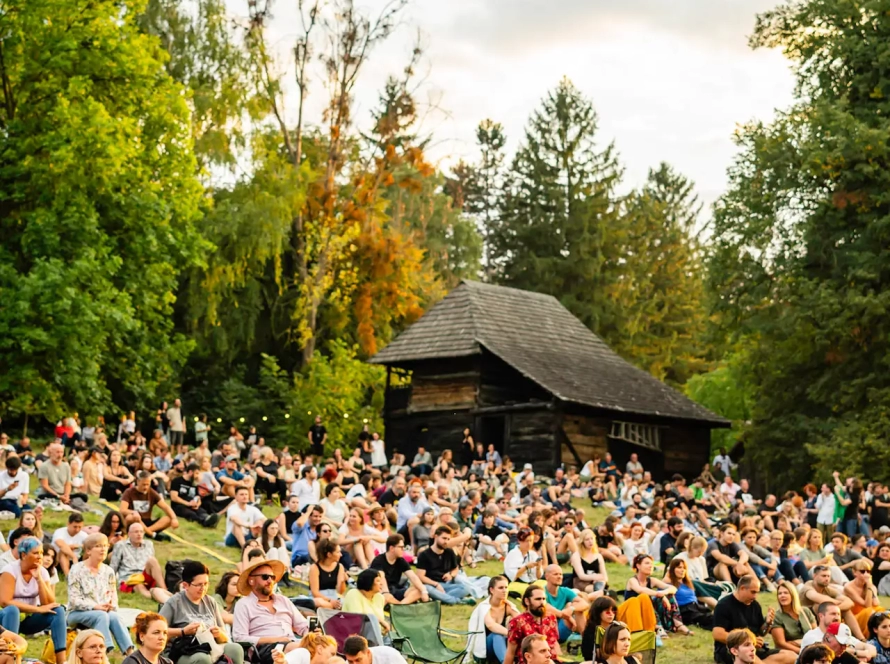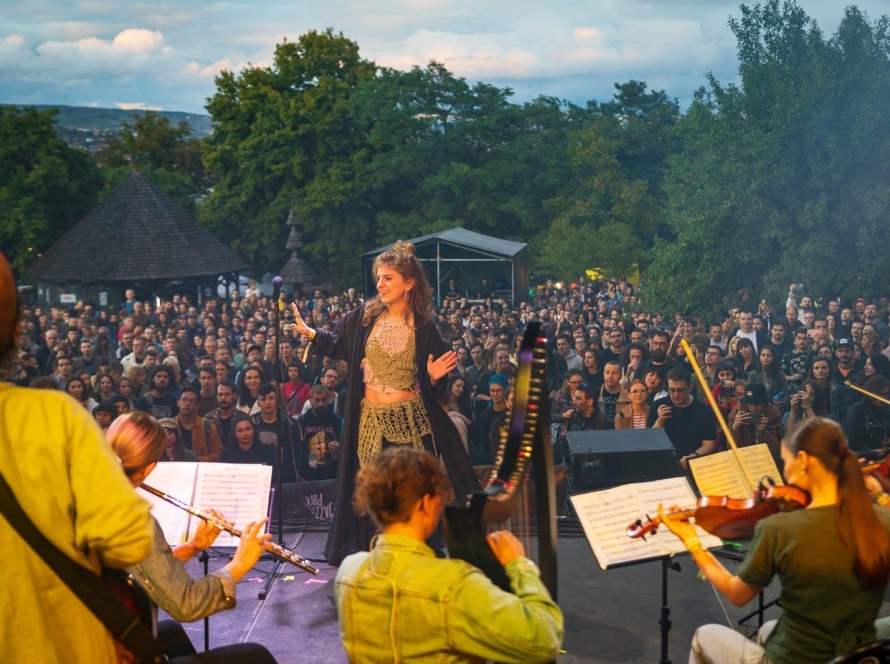7th SENSE. They’ll be on the Jazz in the Park stage this autumn in a brand new project, and you’ll also meet them on the „Întâlniri pe prispă”. But until then, we caught up with them for a little bit to see exactly who they are and what they want from jazz and life. And we truly liked what we found out.
What’s the story behind the name 7th SENSE?
Laura Benedek: At the end of my first year at the Conservatory, I went to the show Tarot Tales”, created by Mircea Tiberian, in which several vocalists from the jazz section participated as well. As it was an interactive show, I also picked a card and I got the Star. Each card had a little song prepared and I remember the lyrics resonated a lot with my mood at the time (and, to be honest, they are still very relevant now). After 3 years, I had the band already formed, but by then it was called Laura’s 5ive (a name taken from London’s jazz scene projects) and I wanted to make a change because we were already starting to have our own compositions and I wanted to create something of our own. I remembered that poem, looked it up, re-read it, still resonated a lot with that message and somewhere in there this name came up and it seemed to fit my story as well as the band’s story. “Come on, trust your intuition. You know exactly what’s going on. You have a seventh sense”. In the meantime, I also looked up what the seventh sense is and, funny enough, I find myself there too. So I guess things were somehow connected.
How do you turn an idea into a track?
Laura Benedek: I think there are several ways to do that, or at least we’ve discovered several ways in which we do that. Either it’s a specific topic that we want to tackle and translate into music (Two Moons, AFTR LPZ), or someone already has a musical idea, and if everyone likes it, we keep working on it and see where it goes. In this case, the song’s title comes only towards the end (With You, Dance Desire, Blood Chapel). It also happens that we know what we want to write about and then we try to ask ourselves questions and challenges to help us with the compositional process (we try to describe what colours we see, what we want to feel when we get to a certain part of the piece etc). And very rarely, but we have one or two pieces built like that, the idea comes up spontaneously when we fool around, jamming. (e.g. Almost Five, the beginning of Violet Lights).
Which album opened up new perspectives on music for you?
Laura Benedek: ”Nubya’s 5ive” by Nubya Garcia. It happened just six years ago when, sadly, I was still surrounded by negative energy and discouraging words. When I discovered the album, and her in particular, I realized that I can and want to do this too, and that anything is possible, even for a girl that’s an instrumentalist. From that moment on I knew I wanted to play only original music and I felt I had finally found my place in the musical world. And ever since… there was no turning back, and I think I’ve achieved some really nice things. And a lot of them are due to this album and her, which to this day is one of my biggest inspirations.
Sergiu Bivol: ”The Imagined Savior Is Far Easier To Paint” is the album of trumpeter Ambrose Akinmusire. He manages to convey throughout the album a thrill close to the bizarre, specifically a sense that something unusual is constantly happening. This album introduced me to a more introspective, philosophical perspective on music.
Lucas Contreras: Miles Davis’s album “Kind of Blue”.
When you think of the perfect jazz piece, what title comes to mind and why?
Laura: I’ll pick two and I’ll try to keep it short. The first one would be “Contemplation” by McCoy Tyner. The song has a power and energy that I honestly can’t describe, but what happens in there is incredible. Really magical. The second one is “Peace” by Nubya Garcia. Much more modern, but it seems to me that through the intensity with which it is sung and the climax at the end of the piano solo, you can understand the message of the piece, that we live in a world that doesn’t really encourage pauses. In the artistic world I find it even harder to do that. I resonate a lot with her music anyway and with the whole ”Source” album, and the quartet she has formed seems equally magical to me. Highly recommend it!
Sergiu: The perfect jazz track never stays the same, but if I had to choose one now it would definitely be ”Street of Minarets” from Dhafer Youssef’s new album. This track simply has all the important elements for a track to be extremely good, and on top of that they are all developed to a high level. An atmospheric intro, an extremely catchy song, a solo and a superb interplay; and on top of that, all the artists on the track are the best in the business.
Lucas: The perfect jazz piece would be Benny Golson’s ”Along came Betty” performed by The Jazz Messengers. Perfect swing, perfect groove.
How do you complement each other? Who plays what role in the band?
Laura: I think we make a very good team, especially musically. We’ve already known each other for a long time and we know what music we like, what music we grew up with, we know our goals and I feel we’ve been able to bring out each other’s strengths. On stage as well, having played together for so long already, we know each other very well and sometimes we can predict which way one or the other will go. So musically we’re pretty much equals and each has a pretty fundamental role. Instead, I myself have been doing all the organizing, promotion, mailings, etc. This year the guys have been a bit more involved in that part and I have to give them credit for that, haha. But basically the administrative/organizational part is usually on me.
Sergiu: I’m extremely attracted to Asian culture, but also to Middle Eastern culture and this can be seen in my musical contribution to the band. Even though music is mostly emotion, I like to refer a lot to the rational, objective side of it such as the technical side, the structure of the songs. When we write, I often ask more pragmatic questions: ”Is this song catchy enough?”, ”How do we section off the song so that there’s a continuous rise?” etc. My role in the band, as a trumpet player, is to get the message of the song across as best as possible. If it’s the interpretation of the song, it’s my role to make it stand out and stay in the audience’s memory for as long as possible. In the solo it’s when I and my colleagues try to create a certain mood, be it joy, party, mystery, etc.
Lucas: Usually Laura gives us an aesthetic direction and suggests a groove, over which I add some harmonies. Once that foundation is established, the three of us start looking for melodic ideas.
Where do your personalities meet the personality of the instrument you play?
Laura: Honestly, I like being a bass player. As cliché as it sounds and perhaps unexpected, given that I’m pretty much in charge of the band’s development on my own (I repeat, on the organisational side etc.), bass is not a lead/front instrument and I like that. I like not being the centre of attention, especially on stage. But at the same time, the bass plays a fundamental role and keeps the whole band steady and together, and I feel like I have done and I still do that, both musically and on the whole journey of us as a band. So yes, I find myself in the instrument on many levels.
Sergiu: I am an extremely sincere person, and by definition I can say that the trumpet can only be sincere. You can’t hide while playing the trumpet, being vulnerable in front of an audience most of the time. That’s something that suits me.
Lucas: Laura has the dream, the initiative, the groove and the aesthetic direction. Sergiu has great melodic sense and impeccable technique, and I have harmonic and orchestration knowledge.
How do you see Romanian jazz?
Laura: A question that I think deserves a separate article, haha. I’m usually very critical when it comes to what’s going on in our local scene, but this time I’m going to focus on what I’ve noticed over the past couple of years, especially since I started curating two concert series: Pure Jazz at the Point, and jazzunited at Control. I see a lot of potential in our generation, and I already feel we’re heading in a good direction. Probably a lot of musicians from the older generation would argue with me and say that no one from our generation knows how to play jazz, but I strongly disagree.
First of all, many projects have come out playing their original music, which I find incredible and I’m really proud of all of them. Before there wasn’t much of a desire to create original music and I’m really happy to see more and more people coming out and trying and composing, putting on gigs and testing what works and what doesn’t. I really think it’s wonderful and I really wanted to see this. Two years ago I think we were maximum 3-5 bands that had original music, and now the number keeps growing significantly. And at the same time I feel like we’re a pretty connected younger generation that doesn’t get so discouraged by people who say we can’t play, that we’re bad instrumentalists and that we’re better off just getting out of the business. I like what’s happening a lot and can’t wait to see how it evolves. Obviously, it’s going to take many more years for it all to come together even better, but I’d say we’re on the right track.
What are your future plans? Where would you like to play?
Laura: There are looots of plans. We want to release our album on vinyl, we want to have merch, a music video, but I think most of all we want to start getting out of the country as much as possible and have small and big tours around Europe and beyond. We can’t wait to play at Jazz in the Park, especially since we’ll be collaborating with three musicians from Berlin, who actually come from Brazil and Tel Aviv. And at the end of September we’ll be making our international debut, in Istanbul. So we’re looking forward to this moment which still seems unreal. I would like us to play at Sziget, North Sea, We Out Here, Glastonbury, Love Supreme and Montreux as well. And at all events actually, we really want to conquer the world with our music, haha. About Montreux, I have a really cool story that I will only tell for the first time at that moment. But I think it will be the most inspiring moment of my life, both for me and for the audience. I’m looking forward to it, so if you know how we could get there, let us know, haha.
Sergiu: The future plans are frankly limitless. We wish to collaborate with different artists who have influenced us: Ibrahim Maalouf, Yussef Dayes etc. To be sponsored by different companies, be it instruments, clothes or products. I would like to get to play in Tokyo, Hong Kong, Sydney and the Montreux Jazz Festival.
Lucas: We want to finish the second album and start playing abroad.




